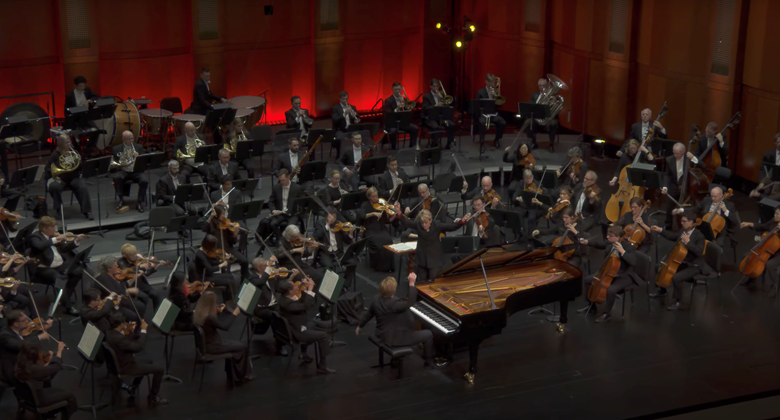Jed Distler's Cliburn Blog No 15: A brain in each finger
Jed Distler
Thursday, June 5, 2025
'Carter Johnson commandeered the complex and unwieldy textures with minimum effort and maximum suppleness and sophistication'

If Philipp Lynov’s mesmerising Ravel Miroirs and Prokofiev Eighth Sonata Semi-final recital cast no doubts about his world-class pianism and artistry, the Liszt A major Concerto with which he opened the second of four Final Round concerts clinched the deal, in a manner of words. The subtleties of touch and timbre, the rhythmic incisiveness and the sense of direction informing each phrase came across just as clearly in person at Bass Performance Hall as I had gleamed from Lynov’s solo rounds via livestream. The marvellously adept Fort Worth Orchestra members were in near-perfect alignment under the reigns of Marin Alsop. Once again, Cliburn finalists are lucky to be working with such attentive and dependable concerto collaborators.
Philipp Lynov:
That Alsop does far more than merely beat time and give cues was evident in the far more challenging second piano concertos of Bartók and Prokofiev that made up the rest of the concert. In the Bartók, for example, she vivified the motoric trajectory characterising the outer movements by consistently clarifying the elaborate brass and woodwind antiphonal strands. She obtained seamless and ethereal playing from the strings in the second movement’s long and sustained chorale-like writing, while the timpani soloist’s suave shifts in pitch framed piano soloist Vitaly Starikov’s free-flowing recitatives. Although Alsop did everything possible not to overpower Starikov’s extensive passages of rapid block chords and swirling arpeggios, somehow the piano part did not project with the kind of cutting-edge brilliance I expected from this gifted pianist. When I returned to my hotel after the concert, I watched these passages on the Cliburn’s YouTube channel, and, indeed, the livestream’s microphone placement revealed more detail within Starikov’s unflappable command of the keyboard writing.
Vitaly Starikov:
From a live venue perspective, however, Carter Johnson’s expressive arsenal of nuances, dynamic gradations, articulations and pedal effects began where Starikov’s left off. I would venture to say that it is due to pianists like Johnson who have a brain in each finger that the Prokofiev Second (the longest and most difficult of his five concertos) has become a competition staple. As Evren Ozel had in his performance of Tchaikovsky’s First Concerto the previous evening, Johnson showed that he too is a master of projection, where every note at every dynamic extreme has body and definition. One heard this straight away in how the right-hand theme elegantly soared over the steady and widely spaced left-hand triplets.
During what must be one of the concerto literature’s longest and most taxing cadenzas, Johnson commandeered the complex and unwieldy textures with minimum effort and maximum suppleness and sophistication. He piled on sonority after sonority without losing focus and point, and the climaxes seemed to shake the room. Throughout the Scherzo’s 187 bars of music, the pianist only plays in unison octaves; here Johnson’s quicksilver tempo and witty interplay with the orchestra simply delighted. The Intermezzo went fabulously well for both Johnson and Alsop, where the phantasmagorical aura in those snarling accents and slithering descending triplet lines remind me of similar gestures in the Nachtmusik movements from Mahler’s Seventh Symphony. Johnson revelled in the Finale’s unpredictable mood swings and almost-cinematic crosscuts, while adjusting his sound to match his surroundings. The soloist, conductor and orchestra must have had fun rehearsing that galvanising coda, which met with a well-deserved standing ovation.
Carter Johnson:
Gramophone is a Media Partner of The Cliburn International Piano Competition

















